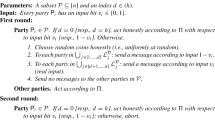Summary
This paper presents a Byzantine Agreement protocol with n = 8t + 1, optimal number of rounds (namely minf + 2, t + 1 where f is number of actual faults), and messages of linear size (namely m ≦ n + O (log n), where m stands for message size). All previous protocols that stop in optimal time and tolerate t = O (n) faults require messages of size at least O (n 2). The new protocol uses a novel technique called Reconstructed Traversal which is based on the Reconstruction Principle and on the Coordinated Traversal protocol.
Similar content being viewed by others
References
Bar-Noy A, Dolev D: Families of consensus algorithms. Proceedings of the Third Aegean Workshop on Computing (1988), pp 380–390
Bar-Noy A, Dolev D, Dwork C, Strong HR: Shifting Gears to expedite Byzantine Agreement. Proceedings of the Sixth Annual ACM Symposium on Principles of Distributed Computing (1987), pp 42–51
Berman P, Garay J, Perry KJ: Optimal early stopping in distributed consensus. In: Segall A, Zaks S (eds) Distributed algorithms, Lect Notes Comput Sci vol 647. Proceedings of the 5th International Workshop on Distributed Algorithms, pp 221–237, 1992
Berman P, Garay J: Distributed consensus with n = 3 • (t + ε) processors. In: Toueg S, Spirakis PG, Kirousis L (eds) Distributed algorithms, Lect Notes Comput Sci, vol 579. Proceedings of the 4th International Workshop on Distributed Algorithms, Delphi, Greece, October 1991, pp 129–142, 1992
Berman P, Garay J, Perry KJ: Towards optimal distributed consensus. Proc 30th Annual IEEE Symposium on Foundation of Computer Science 1989, pp 410–415
Coan B: Efficient agreement using fault diagnosis. Proc. 26th Allerton Conference on Communication, Control and Computing 1988, pp 663–672
Dolev D, Reischuk R: Bounds of information exchange for Byzantinc Agreement. JACM 32: 191–204 (1985)
Dolev D, Reischuk R, Strong HR: Early stopping in Byzantine Agreement. JACM 37: 720–741 (1990)
Fisher M, Lynch N: A lower bound for the time to assure interactive consistency. Inf Process Lett 14(4): 183–186 (1982)
Hadzilacos V, Halpern J: Message optimal protocols for Byzantine Agreement. Proc 10th Annual ACM Symposium on Principles of Distributed Computing 1991, pp 309–324
Moses Y, Waarts O: Coordinated traversal: t + 1 round Byzantine Agreement in polynomial time. Proc. 29th Annual IEEE Symposium on Foundation of Computer Science 1988, pp 246–255
Pease M, Shostak R, Lamport L: Reaching agreement in the presence of faults. JACM 27(2): 228–234 (1980)
Waarts O: Coordinated traversal: Byzantine Agreement in polynomial time. M.Sc. Thesis, Weizmann Institute of Science. Rehovot, Israel (1988)
Zamsky A: New algorithms for agreement problem in synchronous distributed networks. M.Sc. Thesis, (in Hebrew), Tcchnion, Haifa, Israel (1992)
Author information
Authors and Affiliations
Additional information
A preliminary version of this paper was presented in WDAG’92
Rights and permissions
About this article
Cite this article
Zamsky, A., Israeli, A. & Pinter, S.S. Optimal time byzantine agreement for t <n/8 with linear-messages. Distrib Comput 9, 95–108 (1995). https://doi.org/10.1007/s004460050012
Received:
Accepted:
Issue Date:
DOI: https://doi.org/10.1007/s004460050012




